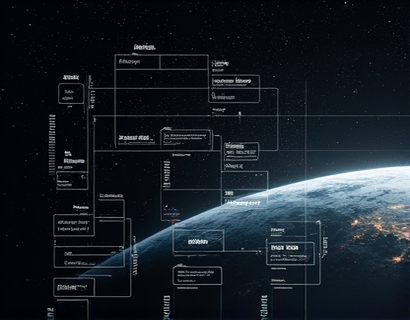Decentralized DAO Management: Revolutionizing Governance with Advanced Analytics and Collaboration Tools
In the rapidly evolving landscape of decentralized finance and autonomous organizations, the management of Decentralized Autonomous Organizations (DAOs) has become a critical area of focus. Traditional governance models are being transformed by innovative software solutions that leverage advanced analytics and collaboration tools. This shift aims to enhance transparency, efficiency, and decision-making within DAOs, ultimately driving sustainable growth and fostering a more engaged community.
Understanding DAO Governance
Before delving into the advancements in DAO management, it's essential to understand the core principles of DAO governance. A DAO is a digital entity governed by smart contracts on a blockchain, allowing for decentralized decision-making. Members of the DAO, typically token holders, propose and vote on changes to the organization's rules and direction. This model aims to eliminate centralized control and distribute power among participants, promoting a more democratic and transparent governance structure.
The Need for Advanced Management Tools
While the concept of DAO governance is promising, it comes with significant challenges. Managing a DAO involves complex processes, including proposal management, voting systems, and community engagement. Traditional methods often struggle with scalability, transparency, and efficiency. To address these issues, advanced software solutions have emerged, designed to streamline DAO management and provide comprehensive analytics. These tools empower DAO administrators and members to make informed decisions, enhance collaboration, and ensure the smooth operation of the organization.
Streamlining Proposal and Voting Processes
One of the primary functions of advanced DAO management software is to simplify the proposal and voting processes. These tools allow members to create, review, and vote on proposals with ease. The software handles the entire lifecycle of a proposal, from submission to execution, ensuring that all steps are transparent and verifiable on the blockchain. This not only reduces the risk of manipulation but also increases trust among community members.
For instance, a proposal can be submitted by any member, detailed in a smart contract that outlines the terms and conditions. The software then automatically notifies the community, allowing a set period for discussion and voting. Once the voting period concludes, the results are tallied and executed automatically, eliminating the need for manual intervention. This streamlined process ensures that governance is both efficient and fair.
Enhancing Transparency and Accountability
Transparency is a cornerstone of successful DAO governance. Advanced management tools provide real-time visibility into all aspects of the organization, from financial transactions to proposal statuses. Blockchain-based ledgers ensure that all actions are recorded immutably, allowing members to audit and verify the organization's activities at any time. This level of transparency builds trust and accountability, crucial elements for maintaining a healthy and engaged community.
Moreover, these tools often include features for reporting and analytics, providing insights into community behavior and governance effectiveness. By analyzing data such as participation rates, proposal outcomes, and member engagement, administrators can identify areas for improvement and make data-driven decisions to enhance the overall governance structure.
Advanced Analytics for Informed Decision-Making
Data-driven decision-making is essential for the sustainable growth of a DAO. Advanced analytics tools integrated into DAO management software offer deep insights into various metrics, helping administrators understand the organization's performance and the community's needs. These analytics can cover a wide range of areas, including financial health, community engagement, and proposal trends.
For example, financial analytics can track token distribution, revenue streams, and expenditure patterns, providing a clear picture of the DAO's financial status. Community engagement analytics monitor participation in discussions, voting, and other activities, helping to identify active and influential members. Proposal analytics track the lifecycle of each proposal, including support levels and voting outcomes, offering valuable feedback for future governance processes.
By leveraging these analytics, administrators can make informed decisions that align with the organization's goals and the community's interests. This data-driven approach not only enhances governance but also fosters a more responsive and adaptive DAO.
Collaboration Tools for Enhanced Community Engagement
Effective collaboration is key to the success of any decentralized organization. Advanced DAO management tools include robust collaboration features that facilitate communication and cooperation among members. These tools go beyond basic messaging and discussion boards, offering a comprehensive platform for collaborative work.
For instance, integrated project management features allow teams to plan, execute, and track projects in real-time. Task assignments, deadlines, and progress updates are all managed within the platform, ensuring that everyone is on the same page. Additionally, file sharing and version control capabilities enable seamless collaboration on documents and code, reducing the risk of miscommunication and errors.
Moreover, these tools often include features for community events and initiatives, such as webinars, hackathons, and meetups. By centralizing these activities within the DAO management platform, organizers can easily manage registrations, track attendance, and gather feedback, enhancing the overall community experience.
Case Studies and Real-World Applications
Several DAOs have successfully implemented advanced management tools, demonstrating the tangible benefits of these solutions. One notable example is a decentralized content creation platform that used a DAO management tool to streamline its governance processes. The platform faced challenges in managing a large and distributed community, but the new tools significantly improved proposal handling and voting efficiency. Members reported higher satisfaction with the transparency and responsiveness of the governance structure, leading to increased participation and engagement.
Another case involves a decentralized finance (DeFi) DAO that utilized advanced analytics to optimize its financial strategies. By analyzing transaction data and market trends, the DAO was able to identify opportunities for yield optimization and risk management. This data-driven approach not only enhanced the DAO's financial performance but also built confidence among token holders, who appreciated the transparent and strategic decision-making.
Challenges and Considerations
While the benefits of advanced DAO management tools are clear, there are several challenges and considerations to keep in mind. One major challenge is the technical complexity of these tools, which can be a barrier for less tech-savvy members. To address this, user-friendly interfaces and comprehensive documentation are essential. Additionally, ensuring the security and reliability of the platform is paramount, as any vulnerabilities could compromise the integrity of the DAO.
Another consideration is the need for community education and adoption. Introducing new tools requires clear communication and training to ensure that all members understand and can effectively use the features. This may involve organizing workshops, creating tutorial videos, and providing ongoing support.
Future Trends in DAO Management
The landscape of DAO management is continually evolving, with several trends shaping the future of decentralized governance. One prominent trend is the integration of artificial intelligence (AI) and machine learning (ML) to further enhance analytics and decision-making. AI can analyze vast amounts of data to predict trends, identify patterns, and provide recommendations, taking governance to a new level of sophistication.
Another trend is the development of interoperable platforms that allow different DAOs to collaborate and share resources. This interoperability can lead to a more connected and cohesive decentralized ecosystem, where organizations can leverage each other's strengths and expertise.
Lastly, the focus on sustainability and environmental impact is becoming increasingly important. DAOs are exploring ways to incorporate eco-friendly practices and support sustainable projects, aligning their governance with global environmental goals.
Conclusion
Advanced DAO management tools are revolutionizing the way decentralized organizations are governed. By streamlining processes, enhancing transparency, and providing powerful analytics, these tools empower administrators and members to make informed decisions and drive sustainable growth. As the technology continues to evolve, the potential for even more innovative solutions is vast, promising a brighter and more efficient future for decentralized governance.










































